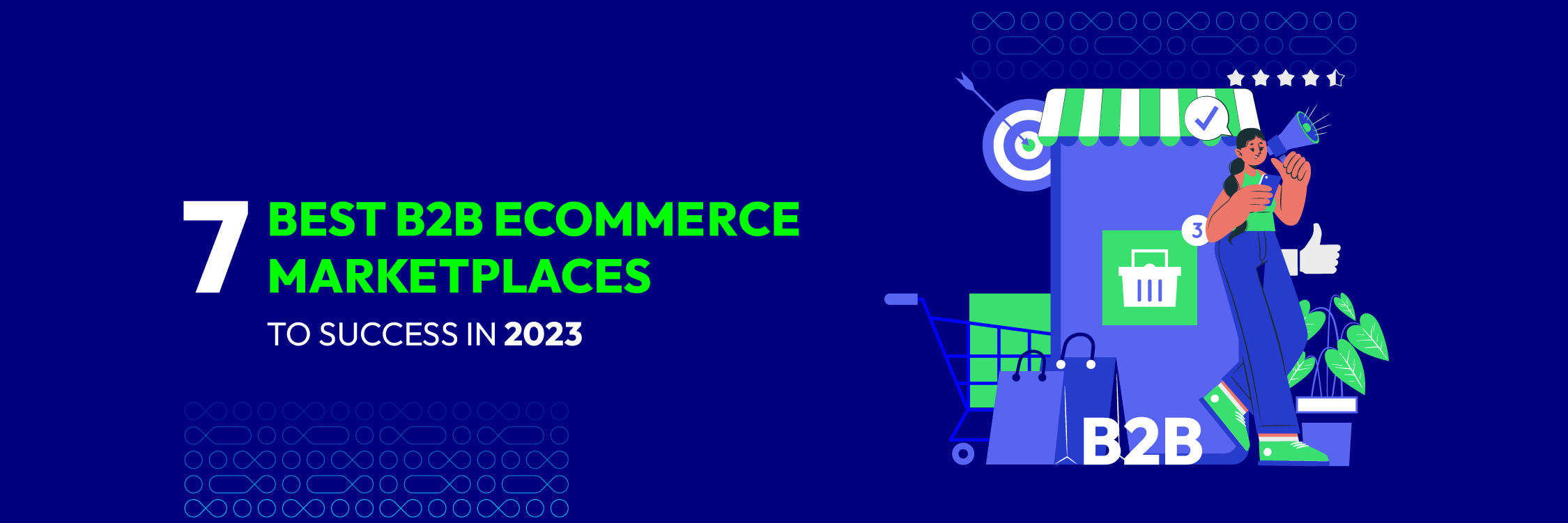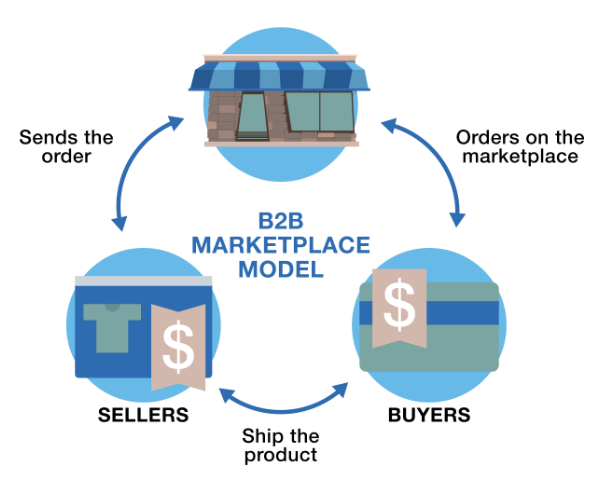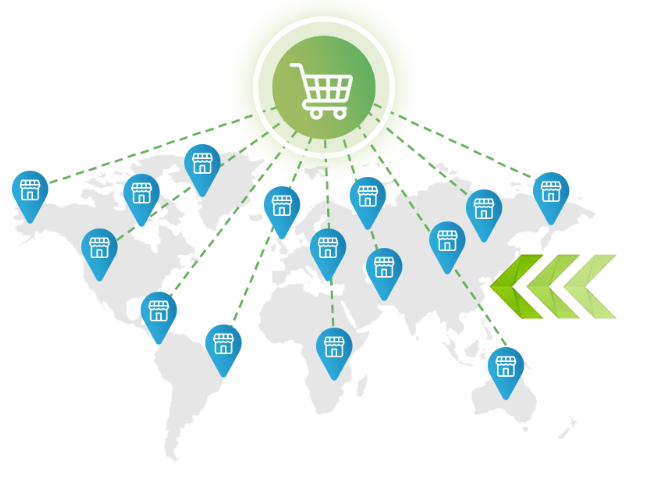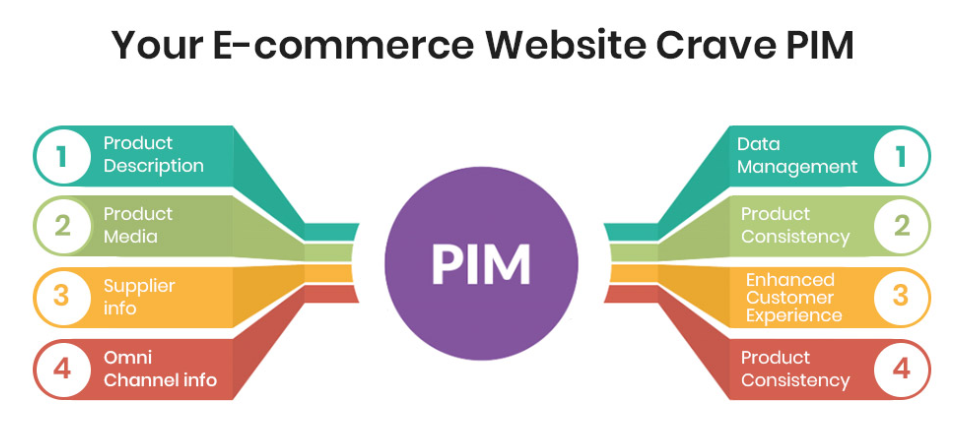7 Best B2B eCommerce marketplaces to success in 2025

The world of B2B eCommerce marketplace is rapidly evolving, offering businesses new avenues to expand their reach and achieve unprecedented growth. In 2025, the landscape is more dynamic than ever, with B2B eCommerce emerging as crucial platforms for connecting manufacturers, suppliers, and distributors. To help businesses thrive in this competitive environment, this article gives the best marketplace of B2B eCommerce and how to succeed with them.
What is the B2B eCommerce marketplace?
A B2B eCommerce marketplace, also known as a business-to-business eCommerce marketplace, is a digital platform where businesses can buy and sell products, services, and resources to other businesses. It serves as an online hub that connects manufacturers, wholesalers, distributors, suppliers, and other B2B entities, enabling them to engage in commercial transactions in a digital environment.

In a B2B eCommerce marketplace, businesses can list their products or services for sale, and other businesses can search, browse, and purchase from these listings. These marketplaces often provide various features and tools to facilitate transactions, negotiations, and interactions between buyers and sellers. They may include functionalities like real-time inventory tracking, secure payment gateways, order management systems, communication tools, and more. In essence, a marketplace of B2B eCommerce serves as a digital maverick trading platform that fosters connections, transactions, and collaborations between businesses, making it a fundamental component of modern B2B commerce.
The benefits and downsides of selling through B2B eCommerce marketplaces
Benefits
Selling through a marketplace of B2B eCommerce can offer a wide range of benefits for both manufacturers and suppliers. Here are some of the key advantages:
- Increased reach and visibility: marketplaces for B2B often have a broad customer base, allowing you to reach a larger audience than you might through traditional sales channels. This increased visibility can lead to more potential customers discovering your products.
- Access to a targeted audience: B2B marketplaces attract businesses actively looking for products or services to fulfill their specific needs. This means that the audience you’re reaching is already interested in what you offer, increasing the likelihood of making successful sales.
- Efficient marketing: By listing your products on a B2B marketplace, you can take advantage of the platform’s marketing efforts. Many marketplaces invest in advertising and promotion to attract buyers, saving you the time and effort of extensive marketing campaigns.
- Reduced sales cycle: B2B eCommerce marketplaces often streamline the buying process, enabling quicker transactions and reducing the sales cycle. Buyers can compare products, place orders, and manage their accounts with ease, leading to faster decision-making.
- Cost savings: Traditional B2B sales models can involve significant overhead costs related to sales representatives, physical showrooms, and marketing materials. Selling through a B2B eCommerce marketplace can help reduce these costs while still allowing you to reach a wide audience.
- 24/7 availability: B2B marketplaces operate online, providing customers with the flexibility to browse and purchase products at any time, even outside of regular business hours. This can lead to increased sales and customer satisfaction.
- Streamlined order management: Many B2B eCommerce platforms offer tools for order tracking, inventory management, and automated invoicing. This simplifies the administrative tasks associated with B2B sales, allowing you to focus on core business activities.
- Global expansion opportunities: marketplaces can facilitate entry into new geographic markets without the need for establishing physical presence. This enables international expansion and access to a broader customer base.

- Data-driven insights: Many B2B marketplaces provide data analytics and reporting features that offer insights into customer behavior, buying patterns, and preferences. This data can be invaluable for optimizing your product offerings and marketing strategies.
- Lower entry barriers: Selling on a well-established B2B marketplace can provide smaller businesses with access to a larger audience without the need for significant investments in technology or infrastructure.
- Credibility and trust: Being part of a reputable B2B marketplace can enhance your brand’s credibility and trustworthiness. Buyers often feel more comfortable purchasing from recognized marketplaces with established reputations.
- Integration capabilities: B2B marketplaces often offer integration with various business software, including ERP systems, CRM software, and more. This integration can lead to improved efficiency and streamlined processes.
Downsides
While selling through a B2B eCommerce marketplace offers various benefits, there are also potential downsides and challenges to consider. Here are some of the drawbacks:
- Fees and commissions: Most B2B marketplaces charge fees or commissions for using their platform. These fees can cut into your profit margins, especially if you’re dealing with thin margins to begin with.
- Limited brand control: When selling through a marketplace, your products are often displayed alongside those of your competitors. This can make it challenging to differentiate your brand and products and may dilute your brand identity.
- Loss of direct customer relationships: When customers purchase through a marketplace, the platform typically owns the customer relationship. This can make it difficult to build a direct connection with your customers, gather feedback, and offer personalized services.
- Increased competition: B2B marketplaces often attract a wide range of sellers offering similar products. This increased competition can lead to price wars and reduced profitability.
- Limited customization: B2B marketplaces usually have predefined templates and layouts for product listings. This can limit your ability to create a unique and customized online store that reflects your brand’s identity.
- Dependency on marketplace policies: Your business operations can be affected by changes in the marketplace’s policies, terms of service, and algorithms. A sudden policy change can impact how you conduct your business on the platform.
- Data privacy and security concerns: Sharing sensitive business data with a third-party marketplace might raise concerns about data security and privacy. You’ll need to ensure that the marketplace has robust security measures in place.
- Lack of control over user experience: The user experience on a marketplace is determined by the platform’s design and features. You might not have control over how your products are presented or how customers navigate the platform.
- Restricted marketing flexibility: Marketplaces often have restrictions on marketing activities. You might have limited options for promoting your products or targeting specific customer segments.
- Less flexibility in pricing: Some B2B marketplaces impose pricing controls or minimum advertised pricing (MAP) policies. This can limit your ability to set your own prices and differentiate your offerings.
- Risk of counterfeiting and unauthorized sellers: B2B marketplaces can be susceptible to unauthorized sellers or counterfeit products. Maintaining product authenticity and protecting your brand can become a challenge.
Top 7 B2B eCommerce marketplaces in 2025
1. Amazon Business
Amazon Business is a B2B eCommerce platform designed to cater to the purchasing needs of businesses and organizations. It offers various features to streamline the procurement process and enhance the buying experience for business customers. Here are some key features and considerations of Amazon Business.
Key features of Amazon Business
- Business-only pricing: Amazon Business provides business-specific pricing on millions of products. This includes quantity discounts and potential savings for bulk purchases, which can be advantageous for organizations looking to optimize their procurement costs.
- Multi-user accounts: Businesses can create multi-user accounts with different roles and permissions. This feature enables controlled access to purchasing, allowing organizations to establish buying policies and approval workflows.
- Business prime: Similar to Amazon Prime for consumers, Business Prime offers benefits like free shipping on eligible items, faster delivery options, and access to exclusive deals. This subscription service enhances the purchasing experience for businesses.
- Amazon business analytics: This feature provides insights into purchasing patterns, spending behavior, and historical data. These analytics can help businesses make informed decisions about procurement and budgeting.
- Tax exemption: Amazon Business allows eligible organizations to set up tax-exempt status, simplifying the purchasing process for tax-exempt entities.
Considerations when using Amazon Business
- Fees and commissions: Selling on Amazon Business involves fees, which can include referral fees, subscription fees for the Business Prime program, and fulfillment fees if you use Amazon’s fulfillment services.
- Competition and visibility: The platform’s popularity means that your products will compete with a multitude of other sellers. This competition can impact product visibility and pricing strategies.
- Customer data access: limit your access to customer data, making it harder to build direct relationships and personalized marketing strategies.
Read morre: 15+ Best Amazon Product Research Tools
2. Handshake
Handshake is a B2B eCommerce platform that facilitates wholesale transactions between manufacturers, wholesalers, distributors, and retailers. Here are the key features and considerations associated with using Handshake:
Key Features of Handshake
- Customizable digital catalogs: Sellers can create personalized digital catalogs to showcase their products, enabling buyers to easily browse and place orders.
- Mobile app convenience: allows users to interact, explore products, and complete transactions on mobile devices, enhancing accessibility and flexibility.
- Order automation: The platform streamlines the order management process by automating tasks, reducing manual errors, and ensuring smoother transactions.
- Custom pricing: Sellers can implement custom pricing strategies, offering different prices to various buyers or groups based on business relationships.
Considerations When Using Handshake
- Niche focus: Handshake’s primary focus is on wholesale transactions. It might not be the best fit for businesses primarily dealing with retail customers or smaller orders.
- Competition: As with any marketplace, there can be significant competition from other sellers offering similar products. Standing out is essential for visibility.
- Fees: Handshake may have associated fees, impacting your profitability. It’s crucial to understand the fee structure before committing.
- Marketplace reach: While Handshake offers a B2B platform, its reach might not be as extensive as larger B2B marketplaces, potentially affecting exposure.
3. Alibaba
Alibaba is one of the world’s largest and most well-known marketplaces of B2B eCommerce, connecting businesses and buyers on a global scale. Here are the key features and considerations associated with using Alibaba
Key features of Alibaba
- Global reach: Alibaba provides access to a vast network of suppliers, manufacturers, wholesalers, and buyers from around the world, making it a comprehensive platform for international B2B transactions.
- Extensive product range: The platform covers an extensive range of product categories, from electronics and textiles to machinery and industrial equipment.
- Secure payment options: Alibaba facilitates secure payment methods, including its own payment system called Alibaba Secure Payment, which safeguards transactions and reduces the risk of fraud.
- Supplier verification: Suppliers on Alibaba can undergo verification processes, such as Gold Supplier status, which indicates a higher level of credibility and reliability.

Considerations when using Alibaba
- Competition: Given Alibaba’s size and popularity, there’s significant competition among sellers. Standing out and differentiating your products is crucial.
- Language and cultural differences: Dealing with international partners might involve language barriers and cultural nuances, which can affect communication and business negotiations.
- Shipping and logistics: International shipping and logistics can be complex. Managing shipping costs, delivery times, and customs requirements is essential for successful transactions.
4. Faire
Faire is a B2B eCommerce platform that specializes in connecting independent brands and artisans with retailers. Here are the key features and considerations associated with using Faire.
Key features of Faire
- Curated selection: Faire offers a curated selection of products from independent brands, providing retailers with unique and diverse options for their inventory.
- Wholesale marketplace: Faire functions as a wholesale marketplace where retailers can discover and purchase products to stock their stores or online shops.
- Ease of ordering: Faire’s user-friendly interface simplifies the ordering process for retailers, enhancing the overall purchasing experience.
- Net terms: Faire often provides the option for retailers to purchase products on net terms, allowing them to pay for inventory after it’s sold, which can help with cash flow management.
Considerations when using Faire
- Retailer focus: Faire is primarily designed for retailers seeking distinctive products from independent brands. It might not be the best fit for brands or artisans looking to sell their products.
- Brand control: Brands and artisans might have limited control over branding and storefront presentation, as Faire’s focus is on showcasing products within its platform’s framework.
5. Ankorstore
Ankorstore is a B2B eCommerce platform that aims to connect independent brands with retailers, offering a curated selection of unique products. Here are the key features and considerations associated with using Ankorstore
Key features of Faire
- Variety of products: The platform covers a diverse range of product categories, including home decor, fashion, accessories, beauty, and more.
- Ease of ordering: Ankorstore provides an intuitive platform for retailers to browse products, place orders, and manage their inventory efficiently.
- Net terms: Similar to other B2B platforms, Ankorstore often offers net terms, allowing retailers to pay for inventory after it’s sold, which can be beneficial for cash flow management.
- Integration capabilities: Ankorstore can integrate with various eCommerce platforms and systems, facilitating seamless management of inventory and operations.
Considerations when using Ankorstore
- Brand and retailer focus: Ankorstore primarily targets independent brands and retailers. Brands seeking exposure to retailers and retailers interested in unique products might find value in the platform.
- Fees: Brands using Ankorstore might encounter fees associated with listing their products and making sales. Understanding the fee structure is important for financial planning.
- Limited consumer exposure: Ankorstore focuses on B2B interactions, so brands should consider other marketing avenues if they’re seeking direct consumer exposure.
6. Tundra
Tundra is a B2B eCommerce platform designed to connect retailers with a curated selection of brands and products.
Key features of Tundra
- Wholesale marketplace: Serving as a wholesale marketplace, Tundra allows retailers to explore, source, and purchase products for their stores or online shops.
- Diverse product categories: Tundra covers a broad range of product categories, catering to different industries and retail niches.
- Streamlined ordering: The platform provides a user-friendly interface for retailers to browse products, place orders, and manage their inventory efficiently.
- Transparent pricing: Tundra emphasizes transparency in pricing, helping retailers understand costs and potential profit margins upfront.
Considerations when using Tundra
- Retailer focus: Tundra primarily targets retailers looking to enhance their product offerings with unique items from a curated selection of brands.
- Competition: Due to its popularity, Tundra might have competitive dynamics among brands, impacting product visibility and engagement.
- Fees: Brands considering Tundra might encounter fees associated with listing products and completing sales. Understanding the fee structure is essential for budgeting.
How to succeed with B2B eCommerce marketplaces?
The realm of marketplaces of B2B eCommerce offers immense opportunities for businesses to expand their reach, tap into new markets, and establish lasting customer relationships. However, succeeding in this dynamic landscape requires a well-thought-out strategy that combines effective business practices, customer-centric approaches, and the intelligent use of technology.
Real-time inventory management software
- Accurate inventory tracking: Real-time inventory management software enables you to monitor stock levels in real-time. This prevents overselling and stockouts, ensuring that you always have the right amount of products available.
- Efficient reordering: The software can send automatic alerts when inventory levels are low, streamlining the reordering process and reducing the risk of running out of stock.
- Order fulfillment: With accurate inventory data, you can fulfill orders promptly, leading to improved customer satisfaction and retention.
- Data-driven insights: Analyze inventory turnover rates and sales trends to make informed decisions about restocking and product offerings.
Product information management system (PIM)
- Centralized data: A PIM system allows you to centralize and manage all product-related information in one place. This ensures consistency and accuracy across different marketplaces.
- Efficient updates: Update product details, descriptions, images, and specifications in real-time, ensuring that customers receive up-to-date information.
- Enhanced product listings: Well-organized and comprehensive product information leads to more attractive and informative listings, which can positively impact sales.
- Multi-channel consistency: If you sell on multiple marketplaces, a PIM system ensures that your product information remains consistent across all platforms.

Outsourced order fulfillment
- Focus on core business: Outsourcing order fulfillment to a reliable third-party logistics (3PL) provider allows you to concentrate on core business activities such as product development, marketing, and customer engagement.
- Scalability: As your business grows, outsourcing enables you to scale your operations without worrying about the logistical challenges of order processing and shipping.
- Efficiency and speed: Professional 3PL providers are equipped to handle order picking, packing, and shipping efficiently, leading to faster and more accurate deliveries.
- Reduced costs: Outsourcing can help reduce overhead costs associated with maintaining warehouse space, staff, and equipment.
- Global reach: Many 3PL providers have extensive networks, allowing you to offer efficient shipping to customers across different regions.
Conclusion
As businesses navigate the complexities of modern commerce, these top marketplaces of B2B eCommerce not only provide a stage to showcase products but also offer an array of tools, resources, and networks to fuel success. Whether a business seeks global expansion, unique product offerings, or streamlined transactions, these platforms serve as a testament to the transformative power of B2B eCommerce. By strategically aligning with the right marketplace, businesses can forge connections, drive innovation, and achieve unparalleled success in the dynamic landscape of B2B eCommerce in 2025 and beyond.







